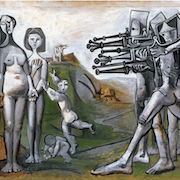|
It's the 70th anniversary of the nuclear bombing so here's a timely article from Salon.comquote:Here we are, 70 years after the nuclear obliteration of Hiroshima and Nagasaki, and I’m wondering if we’ve come even one step closer to a moral reckoning with our status as the world’s only country to use atomic weapons to slaughter human beings. Will an American president ever offer a formal apology? Will our country ever regret the dropping of “Little Boy” and “Fat Man,” those two bombs that burned hotter than the sun? Will it absorb the way they instantly vaporized thousands of victims, incinerated tens of thousands more, and created unimaginably powerful shockwaves and firestorms that ravaged everything for miles beyond ground zero? Will it finally come to grips with the “black rain” that spread radiation and killed even more people — slowly and painfully — leading in the end to a death toll for the two cities conservatively estimated at more than 250,000? What do you think? Was it a bad thing to vaporize hundreds of thousands of civilians or is it hunky dory to commit war crimes? Debate and discuss.
|
|
|
|

|
| # ? May 7, 2024 09:23 |
|
Chomskyan posted:It's the 70th anniversary of the nuclear bombing so here's a timely article from Salon.com War sucks and so did the bombings, but an invasion of the mainland would have been far worse. You can argue whether or not it would have ever come to that, but our military at the time certainly thought it would.
|
|
|
|
Regardless of how awful the atomic bombings were (why doesn't the firebombing of Tokyo and other Japanese cities over the previous months, a campaign against the civilian populations that killed many more people than Hiroshima and Nagasaki combined, come up for such criticism?), that was a very bad article written by someone with very little understanding of the Pacific War and its final stages in particular.7c Nickel posted:You can argue whether or not it would have ever come to that, but our military at the time certainly thought it would. It would have almost certainly come to that. Even after the atomic bombings a group of Japanese army officers led a coup attempt to prevent Hirohito's surrender broadcast in the hopes they could continue the war, and the Soviets had no amphibious capability to speak of capable of launching a serious invasion of Hokkaido. Vincent Van Goatse fucked around with this message at 02:01 on Aug 7, 2015 |
|
|
|
7c Nickel posted:War sucks and so did the bombings, but an invasion of the mainland would have been far worse. You can argue whether or not it would have ever come to that, but our military at the time certainly thought it would. It's also a possibility that the atomic bomb would have been used in support of those invasions. Postwar analysis suggests that the Japanese had pretty well guessed where they were going to take place, so they would likely have been pretty hotly contested.
|
|
|
|
ALL-PRO SEXMAN posted:Regardless of how awful the atomic bombings were (why doesn't the firebombing of Tokyo and other Japanese cities over the previous months, a campaign against the civilian populations that killed many more people than Hiroshima and Nagasaki combined, come up for such criticism?), Probably because firebombs were not the most destructive single act of war in human history Dropping the Atom Bomb was Plus a lot of people do complain about the fire bombing, its just that firebombs had precedent. The atom bomb was and still is unprecedented.
|
|
|
|
Even after the atomic bombings, there were enough members of the Japanese military in favor of fighting on that there was an attempted coup to prevent a surrender. efb
|
|
|
|
Mel Mudkiper posted:Probably because firebombs were not the most destructive single act of war in human history Actually, not true! The firebombings beat out the atomic bombings. http://www.wired.com/2011/03/0309incendiary-bombs-kill-100000-tokyo/
|
|
|
|
Mel Mudkiper posted:Probably because firebombs were not the most destructive single act of war in human history This is a debatable contention, to say the least.
|
|
|
|
So here is the thing about carpet bombing in WW2, whether in Europe or Pacific. With technology that was available at the time you were considered a good shot if your bombardier got your payload with 1000 feet of the target. Multiplied by hundreds of bombers at a time, mutiple times a week, every week, all year. And Japanese industry was particularly decentralized and scattered throughout population centers. How can you condemn one method because it proportionally hits more civilians without condemning the other? Precedent has nothing to do with whether or not it's a war crime. And to take it a step farther, how would the Allies win the war if strategic bombing was morally off limits?
|
|
|
|
I feel like the discussion of whether or not the Japanese would have surrendered or fought to the last man in a land invasion misses part of why the Hiroshima and Nagasaki is so upsetting to many people. We dropped an atomic bomb on somebody. We dropped an atomic bomb
|
|
|
|
Mel Mudkiper posted:I feel like the discussion of whether or not the Japanese would have surrendered or fought to the last man in a land invasion misses part of why the Hiroshima and Nagasaki is so upsetting to many people. No poo poo we did. The point is that a lot of the alternatives would have been, quite possible, even worse.
|
|
|
|
N00ba the Hutt posted:Actually, not true! The firebombings beat out the atomic bombings. N00ba the Hutt posted:Actually, not true! The firebombings beat out the atomic bombings. I am not talking about total numbers. Obviously months of firebombs or a total ransacking of a city would have more deaths and damage. That was why I said "single act" No single action has ever been more destructive than dropping the atomic bomb.
|
|
|
|
Mel Mudkiper posted:No single action has ever been more destructive than dropping the atomic bomb. Only if you define single action in a somewhat arbitrary way.
|
|
|
|
Mel Mudkiper posted:Probably because firebombs were not the most destructive single act of war in human history Except it wasn't? The firebombing of Tokyo was objectively worse. IIRC it was estimated by the Air Force that firebombing alone could erase every Japanese city by 1946. The atomic bombs scared the Japanese into surrender because of their novelty... and because they didn't know we only had like 3 of them.
|
|
|
|
The atomic bomb has conveniently twisted the narrative of the war in post-war Japan. Because of the bombs Japan portrays themselves as being a victim of the war and this overshadows the fact that Japan started the war first place. It's a pretty big reason why Japan continually refuses to acknowledge the rape of nanking.
|
|
|
|
ALL-PRO SEXMAN posted:No poo poo we did, the point is that a lot of the alternatives would have been, quite possible, even worse. The idea of something being worse than using an atomic bomb is honestly hard for me to swallow. Frankly, a several month land battle is not as existentially horrifying as the face we dropped the atomic bomb on a country. Horrible acts of war litter human history. Dropping the atomic bomb was a fundamental paradigm shift of human existence.
|
|
|
|
Mel Mudkiper posted:I am not talking about total numbers. Obviously months of firebombs or a total ransacking of a city would have more deaths and damage. More like a single night of firebombing Tokyo killed more people than either atomic bomb.
|
|
|
|
sean10mm posted:Except it wasn't? The firebombing of Tokyo was objectively worse. IIRC it was estimated by the Air Force that firebombing alone could erase every Japanese city by 1946. Not only that but the US effectively destroyed food distribution networks across Japan by the end of the war: the Japanese people were in for mass starvation had they not surrendered.
|
|
|
|
Mel Mudkiper posted:I am not talking about total numbers. Obviously months of firebombs or a total ransacking of a city would have more deaths and damage. The article is discussing a single night's worth of damage though.
|
|
|
|
Mel Mudkiper posted:The idea of something being worse than using an atomic bomb is honestly hard for me to swallow. You don't know much about World War Two in the Pacific, and especially the land battles, if you think this.
|
|
|
|
All the intentional bombings of civilians were despicable war crimes and the people in charge of terror bombing on both sides of the war were monstrously immoral. End of story. Sure, continuing the war would have meant more civilian deaths, but only because both sides were doing their utmost to slaughter innocents with barely a fig leaf to pretend at decency. They could have, you know, not been mass-murderers.
|
|
|
|
It certainly was not a nice thing to have happened and I will grant that atomic weapons are especially unpleasant. That being said, I'm relatively sure that both cities would have been absolutely annihilated through conventional bombing much earlier into the war had they not been specifically "spared" for what happened to them. I somewhat expect that to be the case for all major cities had Japan not surrendered. I'm not going to argue or think about if Hiroshima/Nagasaki and atomic weapons sped up or slowed down the surrender, or if it was necessary to save American lives or not. I think the issue at heart is not so much about the bomb, rather whether or not terror campaigns against civilian population centers are acceptable. If they're not, then they're not; I am not sure that it matters if it's 500 B-29s participating with conventional weapons or just the one with extra special cargo. It's different, obviously. But not different enough? I could easily see it from the perspective of someone at the time, particularly if you're already down with firebombing campaigns. I also can see how someone from today would say that it's different because it was the first time someone dropped an atomic bomb on someone else? To me, one bombing operation with a single bomb and a single plane and X number dead does not feel different than one bombing operation with thousands. That's my unsatisfying answer.
|
|
|
|
ALL-PRO SEXMAN posted:You don't know much about World War Two in the Pacific, and especially the land battles, if you think this. Or I recognize the atomic bomb as a uniquely horrifying moment in human history. If you do not find the concept of an atom bomb existentially terrifying on a unique level we are at impasse.
|
|
|
|
Much ado about nothing.
|
|
|
|
Mel's kind of talking about something different but I reeeealllly want someone who is anti-nuking Hiroshima to address this: For the people on the ground it made little difference if you were killed by an atomic bomb in Hiroshima or a fire bomb in Tokyo, Osaka,Hamburg or Dresden. If you question the Hiroshima and Nagasaki bombings, the whole allied bombing campaign has to be questioned. Japanese industry was especially spread out. Bombers were really, really inaccurate back then. Do the math. So was Allied urban bombing throughout the war justifiable or not?
|
|
|
|
ALL-PRO SEXMAN posted:You don't know much about World War Two in the Pacific, and especially the land battles, if you think this. It took a few month just to take Okinawa: a small island, the Japanese resisted fanatically and over a hundred thousand died to defend the Island. The home islands themselves would have being a hundred times worse
|
|
|
|
DeusExMachinima posted:. So was Allied urban bombing throughout the war justifiable or not? And if you say no, how exactly should we have prosecuted a war where Japan was busy doing even more monstrous things than us?
|
|
|
|
anime
|
|
|
|
Mel Mudkiper posted:Or I recognize the atomic bomb as a uniquely horrifying moment in human history. I agree that it was a uniquely horrifying moment in human history. However, I'd say it was far from the being the most uniquely horrifying event of 1945, or even of the whole loving war.
|
|
|
|
Mel Mudkiper posted:I feel like the discussion of whether or not the Japanese would have surrendered or fought to the last man in a land invasion misses part of why the Hiroshima and Nagasaki is so upsetting to many people. And? What about the atomic bomb at that time was so uniquely terrible compared to all the other ways used to attack cities during WWII? Do you expect everyone to fall apart into a tizzy of white guilt just because you surround "atomic bomb" with enough italics and underlines?
|
|
|
|
icantfindaname posted:anime this might actually be a serious answer because a number of people refuses to believe japan did anything wrong because how could the land which gave us naruto and anime girl dating games be bad?
|
|
|
|
icantfindaname posted:anime I wish you couldn't find the post button.
|
|
|
|
Are we actually arguing that conventionally firebombing entire cities with the express intent of killing hundreds of thousands of men, women, and children was anything other than a horrific crime against humanity? If you want to argue about strategic bombing and how it was impossible with the technology of the day to destroy Romanian oil fields or German military plants without inadvertently killing a ton of civilians, there's an argument to be had there. But deliberately murdering noncombatants just to terrorize the enemy population, no that's unjustifiable. I don't understand how that's a point in favor of the atomic bombs at all "but we were totally willing to murder even more people with incendiaries!" Uh, okay that was also hideous?
|
|
|
|
Mel Mudkiper posted:The idea of something being worse than using an atomic bomb is honestly hard for me to swallow. Well of course it was scarier, that's why it ended the war. But if we care about civilian death toll - which I thought was why we were upset about this poo poo in the first place? - then it wasn't anything special in the context of WWII battles or air campaigns. That's just a fact. In WWII land battles in population centers produced absolutely insane civilian death tolls. Invasion didn't mean civilian lives being spared, quite the opposite. It was actually the hydrogen bomb and the Cold War arms race that took the destructive potential of war into a completely different realm. Think one warhead worth 20 hiroshimas or more, and up to a dozen of those on one missile.
|
|
|
|
VitalSigns posted:Are we actually arguing that conventionally firebombing entire cities with the express intent of killing hundreds of thousands of men, women, and children was anything other than a horrific crime against humanity? No, we're asking how, once you accept that those firebombings were horrific crimes against humanity, what exactly makes the atomic bomb worse.
|
|
|
|
-Troika- posted:And? What about the atomic bomb at that time was so uniquely terrible compared to all the other ways used to attack cities during WWII? Do you expect everyone to fall apart into a tizzy of white guilt just because you surround "atomic bomb" with enough italics and underlines? If the idea of entering the age of atomic warfare isn't terrifying to you I do not think its something you can be convinced of in an argument.
|
|
|
|
Here's what's indefensible revisionism: claiming that the Japanese were the victims in the entire situation in any way. Mabye they shouldn't have spent years raping and murdering their way across literally half of China, which, by the way, the Japanese government still hasn't apologized for or acknowledged to this loving day.
|
|
|
|
Mel Mudkiper posted:If the idea of entering the age of atomic warfare isn't terrifying to you I do not think its something you can be convinced of in an argument. But then your problem isn't with bombing Hiroshima per see, it's with the invention of atomic weapons period
|
|
|
|
N00ba the Hutt posted:Even after the atomic bombings, there were enough members of the Japanese military in favor of fighting on that there was an attempted coup to prevent a surrender. None of those officers were high up, and they went ahead despite not getting support from anyone important. That coup was never going to succeed against the Emperor, and there's no evidence that without the bombings anyone of consequence would have joined them.
|
|
|
|

|
| # ? May 7, 2024 09:23 |
|
If the strategy were to force a Japanese surrender without the atom bomb, the solution would be to categorically eliminate the possibility of invading the home isles. That was the Japanese military's plan. Their best hope was that the US would invade, and they could use everything they stored up(they were building reserves in Japan of everything for over a year for this eventuality). The prospect of no battle but utter starvation probably would have resulted in surrender. Would this have been better than the bomb, though? I'll let you guys judge.
|
|
|











 This poster loves police brutality, but only when its against minorities!
This poster loves police brutality, but only when its against minorities!








